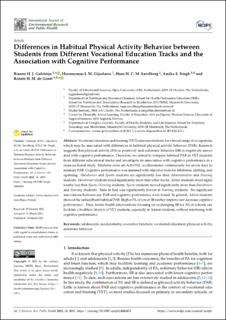| dc.contributor.author | Golsteijn, Rianne H. J. | |
| dc.contributor.author | Gijselaers, Hieronymus J. M. | |
| dc.contributor.author | Savelberg, Hans H. C. M. | |
| dc.contributor.author | Singh, Amika S. | |
| dc.contributor.author | de Groot, Renate H. M. | |
| dc.date.accessioned | 2021-10-13T11:45:28Z | |
| dc.date.available | 2021-10-13T11:45:28Z | |
| dc.date.created | 2021-07-08T10:51:58Z | |
| dc.date.issued | 2021 | |
| dc.identifier.citation | Golsteijn, R. H. J., Gijselaers, H. J. M., Savelberg, H. H. C. M., Singh, A. S., & de Groot, R. H. M. (2021). Differences in Habitual Physical Activity Behavior between Students from Different Vocational Education Tracks and the Association with Cognitive Performance. International Journal of Environmental Research and Public Health, 18(6), 3031. | en_US |
| dc.identifier.issn | 1661-7827 | |
| dc.identifier.uri | https://hdl.handle.net/11250/2791052 | |
| dc.description.abstract | Vocational education and training (VET) educates students for a broad range of occupations, which may be associated with differences in habitual physical activity behavior (PAB). Research suggests that physical activity (PA) is positively and sedentary behavior (SB) is negatively associated with cognitive performance. Therefore, we aimed to compare habitual PAB in VET students from different educational tracks and investigate its association with cognitive performance in a cross-sectional study. Students wore an ActivPAL accelerometer continuously for seven days to measure PAB. Cognitive performance was assessed with objective tests for inhibition, shifting, and updating. Hairdresser and Sports students sat significantly less than Administrative and Nursing students. Hairdresser students stood significantly more than other tracks. Admin students stood significantly less than Sports/Nursing students. Sports students moved significantly more than Hairdresser and Nursing students. Time in bed was significantly lowest in Nursing students. No significant associations between any PAB and cognitive performance were found. In general, Admin students showed the unhealthiest habitual PAB. Higher PA or lower SB neither improve nor decrease cognitive performance. Thus, future health interventions focusing on exchanging SB for PA at schools can facilitate a healthier lifestyle of VET students, especially in Admin students, without interfering with cognitive performance. | en_US |
| dc.language.iso | eng | en_US |
| dc.publisher | MDPI | en_US |
| dc.rights | Navngivelse 4.0 Internasjonal | * |
| dc.rights.uri | http://creativecommons.org/licenses/by/4.0/deed.no | * |
| dc.title | Differences in habitual physical activity behavior between students from different vocational education tracks and the association with cognitive performance | en_US |
| dc.type | Peer reviewed | en_US |
| dc.type | Journal article | en_US |
| dc.description.version | publishedVersion | en_US |
| dc.rights.holder | © 2021 by the authors. | en_US |
| dc.subject.nsi | VDP::Samfunnsvitenskap: 200::Pedagogiske fag: 280 | en_US |
| dc.source.volume | 18 | en_US |
| dc.source.journal | International Journal of Environmental Research and Public Health | en_US |
| dc.source.issue | 6 | en_US |
| dc.identifier.doi | 10.3390/ijerph18063031 | |
| dc.identifier.cristin | 1920952 | |
| dc.source.articlenumber | 3031 | en_US |
| cristin.ispublished | true | |
| cristin.fulltext | original | |
| cristin.qualitycode | 1 | |

